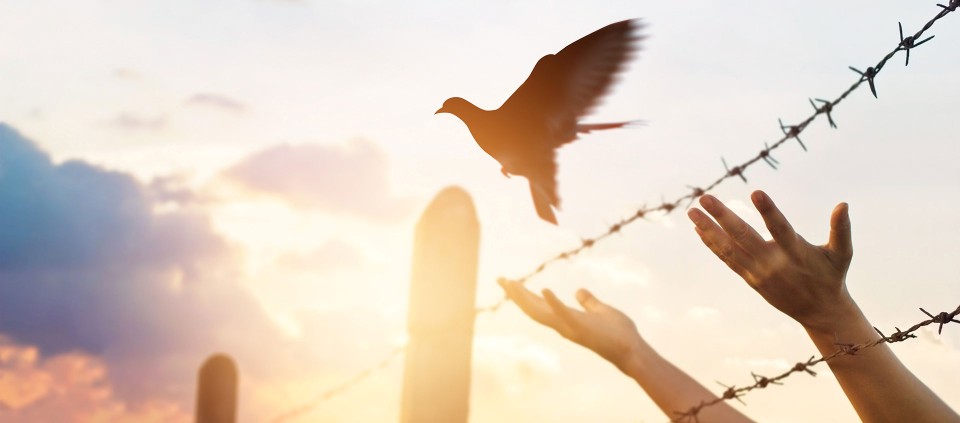In the Temple of Forgiveness

No matter what happens, we can always return to the greatness of the heart.
We have all heard stories about the mysterious power of compassion and forgiveness in the lives of others. Each time we are inspired by those accounts, we remember that we, too, can forgive.
Roberto De Vicenzo, the famous Argentine golfer, once won a tournament, and after receiving the check and smiling for the cameras, he went to the clubhouse and prepared to leave. Sometime later he walked along to his car in the parking lot and was approached by a young woman. She congratulated him on his victory and then told him that her child was seriously ill and near death.
De Vicenzo was touched by her story and took out a pen and endorsed his winning check for payment to the woman. “Make some good days for the baby,” he said as he pressed the check into her hand.
The next week he was having lunch in a country club when a PGA official came to his table. “Some of the guys in the parking lot last week told me you met a young woman there after you won the tournament.” De Vicenzo nodded. “Well,” said the official, “I have news for you. She’s a phony. She’s not married. She has no sick baby. She fleeced you, my friend.”
“You mean there is no baby who is dying?” asked De Vicenzo.
“That’s right.”
“That’s the best news I’ve heard all week,” said De Vicenzo.
The heart is released whenever we forgive or are forgiven, even in the most painful circumstances. In ancient Hawaii, if a person had broken a terrible taboo or was accused of a crime, there was always a way out. No matter what he had done, if he could get himself inside the lava rock walls of Pu’uhonua, the ocean-side Temple of Refuge, the priests would offer a ritual of purification and forgiveness. Then he was allowed to return home unharmed.
In the temple of forgiveness, we are reminded of our own goodness. If only we could help each other build temples of forgiveness instead of prisons.
We can, in our own hearts. No matter how extreme the circumstances, a transformation of the heart is possible.
Once, on the train from Washington to Philadelphia, I found myself seated next to an African-American man who had worked for the State Department in India but had quit to run a rehabilitation program for juvenile offenders in the District of Columbia. Most of the youths he worked with were gang members who had committed homicide.
One 14-year-old boy in his program had shot and killed an innocent teenager to prove himself to his gang. At the trial, the victim’s mother sat impassively silent until the end, when the youth was convicted of the killing. After the verdict was announced, she stood up slowly and started directly at him and stated, “I’m going to kill you.” Then the youth was taken away to serve several years in the juvenile facility.
After the first half year, the mother of the slain child went to visit his killer. He had been living on the streets before the killing, and she was the only visitor he’d had. For a time they talked, and when she left, she gave him some money for cigarettes. Then she started step-by-step to visit him more regularly, bringing food and small gifts. Near the end of this three-year sentence, she asked him what he would be doing when he got out. He was confused and very uncertain, so she offered to set him up with a job at a friend’s company. Then she inquired about where he would live, and since he had no family to return to, she offered him temporary use of the spare room in her home.
For eight months he lived there, ate her food, and worked at the job. Then one evening she called him into the living room to talk. She sat down opposite him and waited. Then she started,
“Do you remember in the courtroom when I said I was going to kill you?”
“I sure do, ma’am,” he replied.
“Well, I did,” she went on. “I did not want the boy who could kill my son for no reason to remain alive on this earth. I wanted him to die. That’s why I started to visit you and bring you things. That’s why I got you the job and let you live here in my house. That’s how I set about changing you. And that old boy, he’s gone. So now I want to ask you, since my son is gone, and that killer is gone, if you’ll stay here, I’ve got room, and I’d like to adopt you if you let me.” And she became the mother of her son’s killer, the mother he never had.
Our own story may not be so dramatic, yet we have all been betrayed.
We must each start where we are. In large and small ways, in our own family and community, we will be offered the dignity and freedom that learns to patiently forgive over and over.
Find out about upcoming programs with Jack Kornfield at Kripalu.
Excerpted with permission from Bringing Home the Dharma: Awakening Right Where You Are, by Jack Kornfield.
Jack Kornfield, PhD, one of the leading Buddhist teachers in the West, is author of 16 books and a founding teacher of the Insight Meditation Society and Spirit Rock Center.
Full Bio and Programs